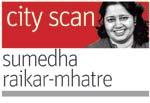As exam fever grips the city, looking at the perennial debate of having an education degree vs learning in the classroom of life

 As the tenth standard exam fever grips Mumbai schools, students ready themselves up for their first public exam in Maharashtra. Like every year, tenth standard-focused coaching assumes serious proportions and solidifies itself as a legitimate industry.
As the tenth standard exam fever grips Mumbai schools, students ready themselves up for their first public exam in Maharashtra. Like every year, tenth standard-focused coaching assumes serious proportions and solidifies itself as a legitimate industry.
And, at a time when a sizeable population is dealing with the crucial barometer of academic success, a fledgling theatre group in Mumbai mounts a British comedy that questions the examination system. Willy Russell’s Educating Rita is set in the 1980s in working class London.
ADVERTISEMENT

Pradnya Shastri (l) and Ajit Kelkar in the play, Educating Rita
It speaks of the worth (or the lack of it) of an academic degree or a supposed milestone. Does a degree signify real learning or is it a passport to a better-equipped and respectable life? Do formal learning classes rob the student of the ability of spontaneous critical appreciation?

When crunch time beckons
Playwright Russell asks these questions by presenting the life of a 26-year old hairdresser named Rita who is in search of a university degree. The questions seem universal and apply to situations the world over. At one point they attracted the late veteran director Satyadev Dubey who mounted the play with actress Neena Kulkarni playing his student.

Part of the system
Like Dubey, Ajit Kelkar (the actor who brought RK Laxman’s Common Man to life) recently found the script relevant to the Indian scene. He has now produced the play in which Pradnya Shastri plays Rita and Kelkar has donned the role of her tutor. The Kelkar-Shastri duo are being directed by Pratima Kulkarni.
No changes
It is interesting that director Kulkarni and her two actors preferred to present Rita without making any changes, or without injecting any Indian sensibilities into the script.
“More than the subject, it was the literary style that three of us liked. As we started deliberating on its relevance, we felt we couldn’t have found a more applicable and true-to-life play,” tells Kelkar, who has incidentally taught Economics in a Mumbai college.
“I could identify with Rita’s search for a means to rise in life. She is looking for a leap and I know how formal classroom learning can result in that transformative leap, notwithstanding the fact that real learning may or may not happen in this set up.”
Going under the skin
For Pradnya Shastri, Rita’s story is also that of a married woman who is unable to live life on her own terms. “Rita has few opportunities at her disposal and she thinks that clearing an exam can make life better for her,” Shastri says.
She feels any Indian woman can empathise with Rita, which makes the role even more doable. Interestingly, Shastri is a qualified dermatologist, apart from being a stage actress. She has recently launched an online media platform on Facebook (Bodycurry) which addresses skin-related queries and popular skin myths.
As a skin doctor, Shastri has found Rita a liberating character. “Rita stands for working class spontaneity and a zest for life two qualities that enrich any academic discipline, whether it is language learning or dermatology.
I find myself lucky to have gotten this role because it shows the cultural dimension of any learning experience. Learning has to be immersive and it has to factor in the cultural baggage of the student,” feels Shastri, as she prepares for the upcoming performance in Cochin soon.
Marketing Rita
The small-time Maitri theatre group is now trying its best to present Rita to wider audiences in Mumbai. They have so far tapped the cosy theatre spaces of the National Centre for the Performing Arts (NCPA), Ravindra Natya Mandir and Sathaye college, as the two-actor drama lends itself to an intimate location as against a large spacious auditorium.
It is another story that the group cannot afford a large hall. Considering the steep per show production cost, which includes the sizeable royalty to the London-based Samuel French publishing house which owns the play’s rights, it has not been easy to have too many shows. But the idea is to keep the shows going every month and not let the logistics discourage the venture.
English department! Please
Educating Rita can be staged with minimal props and which is why city colleges, and particularly the English Literature departments, have been approached by the theatre group. These departments can form an apt audience for the play, which talks about adding more significance and pep to the act of teaching literature.
The play has so far not succeeded in getting the attention of the English department heads. Knowing university mechanisms, it is possible that department heads may respond only after the higher-ups grant legitimacy to the idea of exposing literature students to Rita’s takeaways.
Director’s Note
Director Kulkarni feels Rita has a legitimate message for advocating less formal and more out-of-the-box education. But she maintains that merely exposing students and teachers to Educating Rita will not influence people. “As a director, I have no objection to the wider marketing of the play, in whichever sector.
I will be happy to see more takers. But let us be mindful that our education system has little scope for experimentation. Even for those who accept and appreciate spontaneity of expression, it is not easy to put it in the everyday system.”
We agree. but...
Educating Rita speaks of the shortcomings of institutional education. It underlines the magic that real cohesive education can do. In India, the education debate is a bit more complex than portrayed in the work of art. Almost all Indian academicians, education and career guidance experts and the Education Ministry agree (in principle) that education should not rest on rote learning.
Every school claims to impart knowledge beyond the syllabus books and every state-level or national exam board envisages all-round development. It is another fact that the execution of these lofty principles and avowed goals is not successfully accomplished.
Sumedha Raikar-Mhatre is a Mumbai-based culture chronicler.
 Subscribe today by clicking the link and stay updated with the latest news!" Click here!
Subscribe today by clicking the link and stay updated with the latest news!" Click here!







